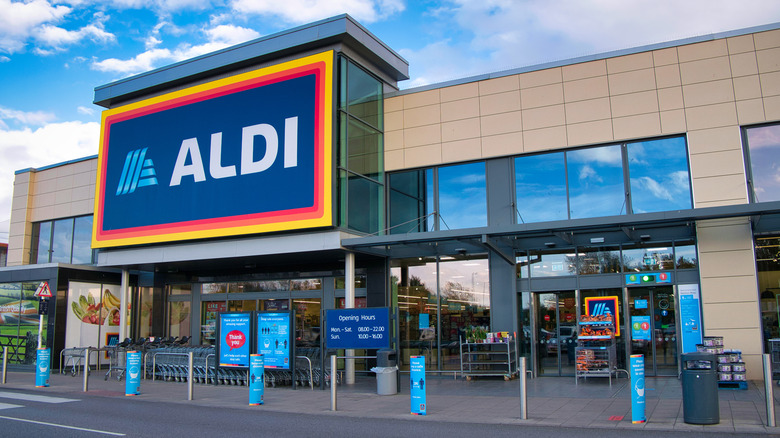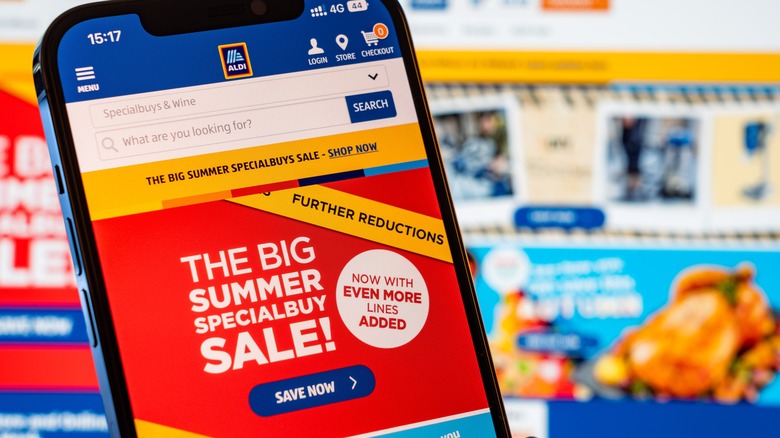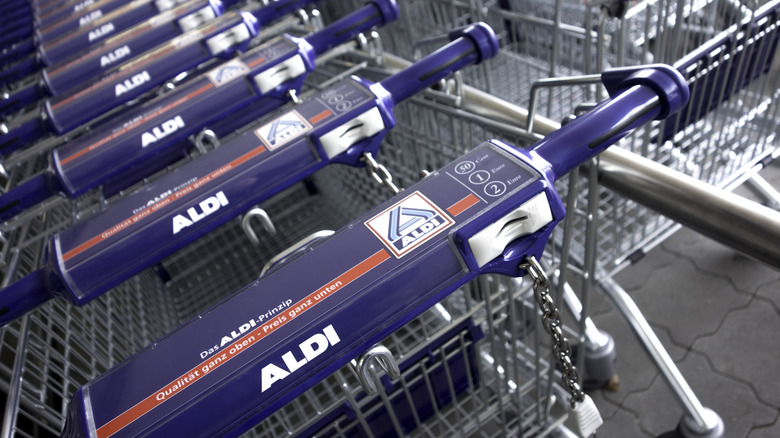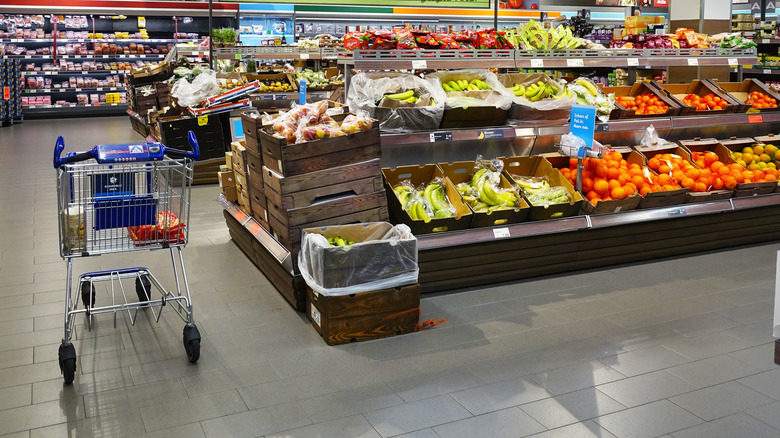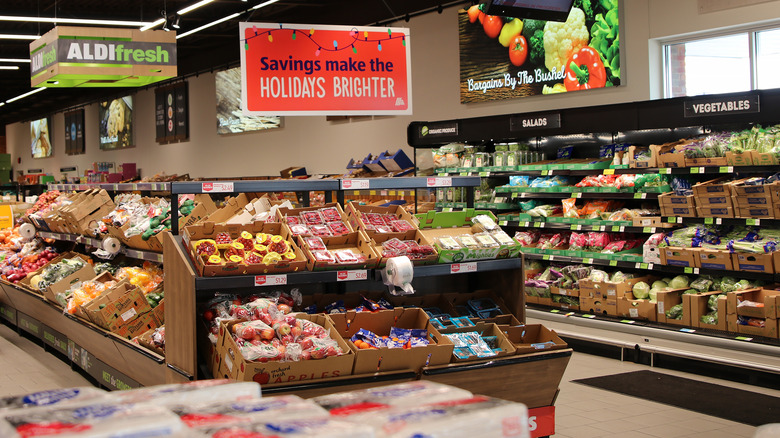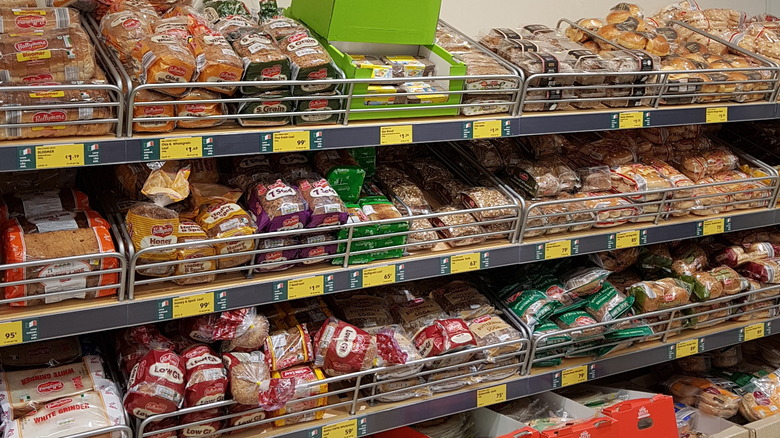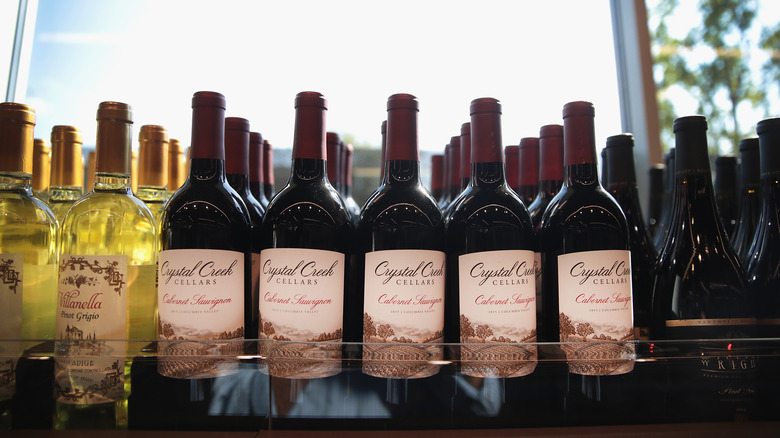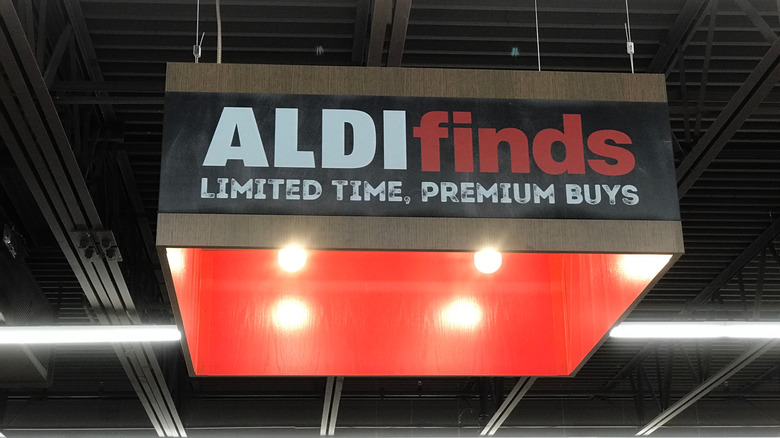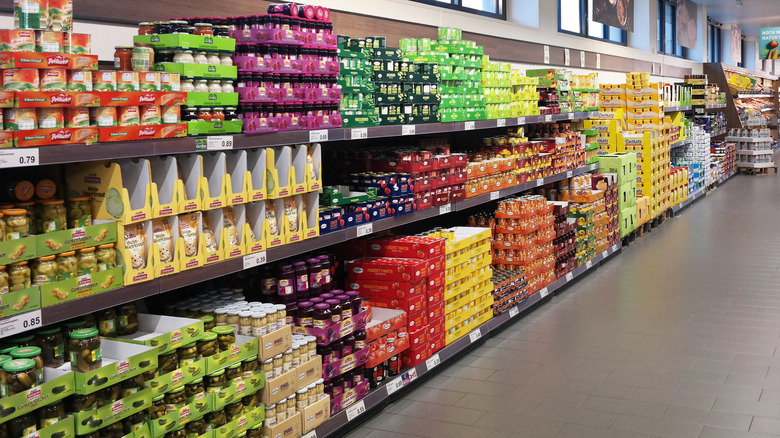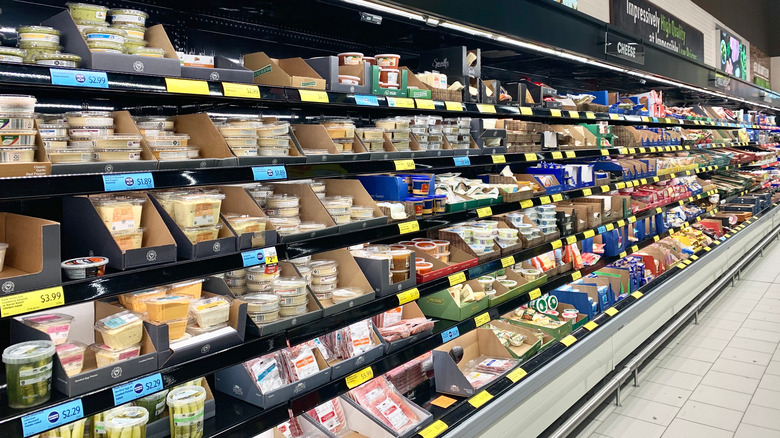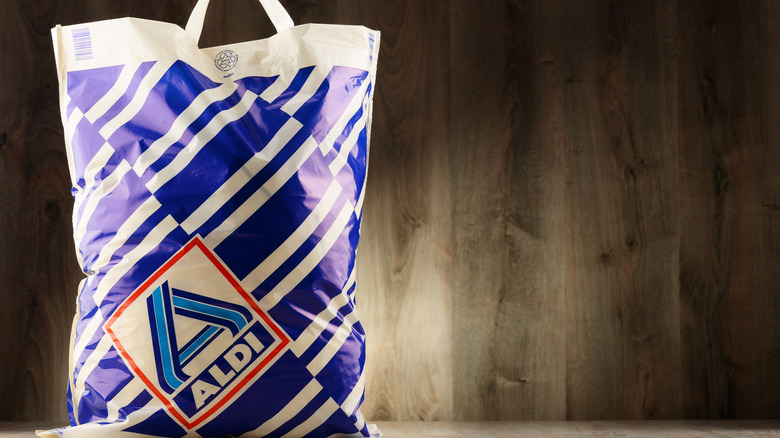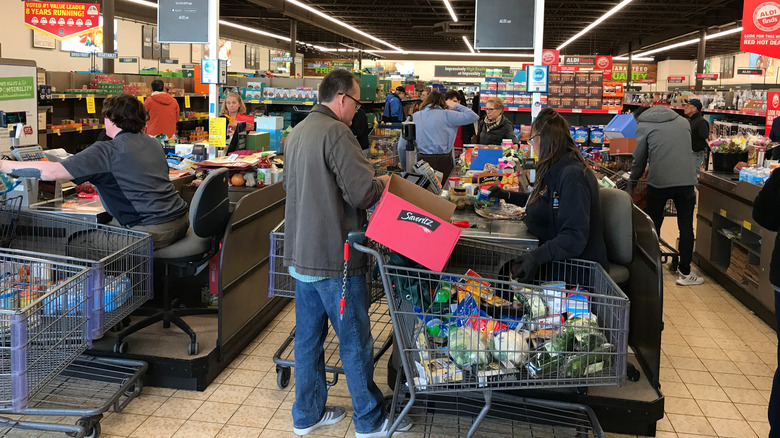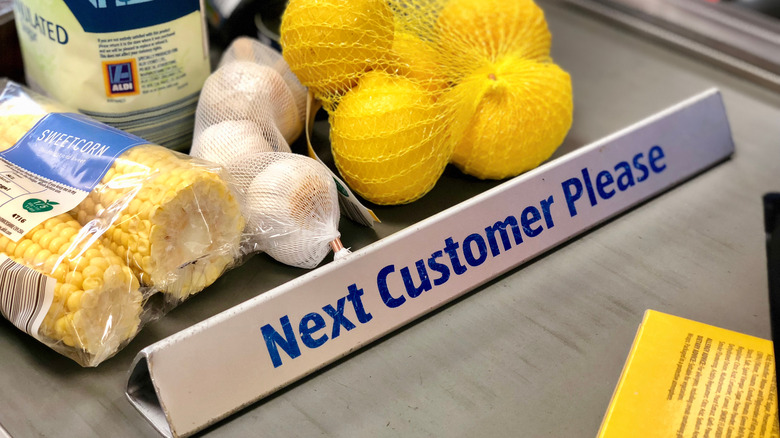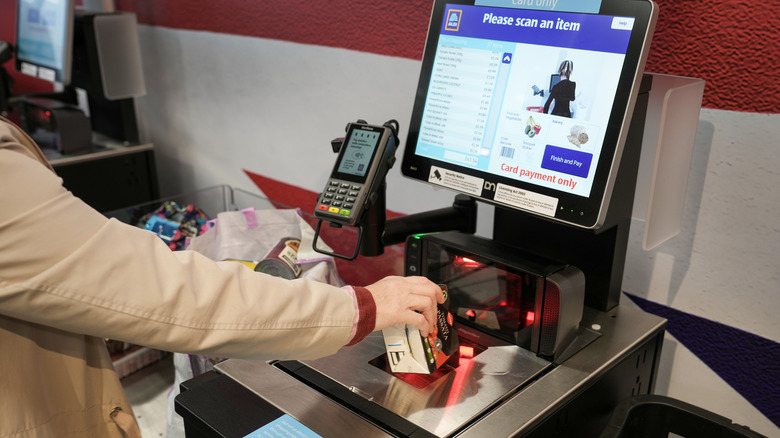What You Need To Know Before Your First Trip To Aldi
A grocery trip to Aldi is an experience like no other. The chain, based in Germany, has had stores in the United States for almost 50 years but still retains many European customs as well as some unique aspects of its own. This can make it confusing for people who've never shopped there before, especially for Americans who aren't used to the way European grocery stores work.
Aldi was Germany's first discount grocer, and it continues to pride itself on low prices and a no-frills shopping experience today. The company uses a variety of methods to lower its prices, which can result in an untraditional shopping experience. If you've never shopped at Aldi before, you may walk into the store unprepared and overwhelmed at how different everything is. To make the process easier, we've put together this guide of what you need to know before your first trip to Aldi.
(Almost) everything is cheaper at Aldi
Aldi is focused on bringing low prices to consumers, and as a result, nearly everything at Aldi is cheaper than that of other store brands, like Target's Good & Gather and even Walmart's Great Value. While it largely depends on your location, in general, the prices of Aldi's store brands will beat those of other grocers and big box stores. These low prices include a range of products, like meat, milk, eggs, pantry staples, frozen goods, and more. The biggest exception here is the few name-brand items it sells, which, unless on sale, are usually not less expensive.
Aldi uses a few different methods to keep prices low. For example, you won't find fancy displays at Aldi; items are displayed in their original shipping boxes. It also have relatively small store layouts and only stock the most popular grocery items. That means there are some things, like lightbulbs, batteries, and newspapers, that you usually won't find at Aldi.
You'll need a quarter for the carts
Another way Aldi saves the company, therefore, the customers money is by forgoing cart corrals or extra staff for cart collection. Instead, Aldi Aldi requires a quarter to unlock carts, which isn't particularly uncommon for European grocers. But don't worry, you'll get it back as long as you put the cart back. In fact, that's the whole goal of the quarter system: To get customers to return their carts back to the same place.
All the carts are kept near the store entrance and are chained together. To unlock a cart, simply put a quarter in the slot. Then go about your shopping as normal, get through checkout, and bring your items to your car. Instead of bringing your cart to a corral in the middle of the parking lot, you'll bring it back to where you got it. Once you chain the cart back up, the quarter will pop out.
Some people have come up with "hacks" to get around the quarter requirement, like using their keys to trigger the lock mechanism or even a special tool for these kinds of carts. The only problem with this is you aren't always guaranteed to have the same cart after checkout, as we'll explain later. Instead, if you're short a quarter, you can always try asking an employee to borrow one.
You won't find many brand-name products
Don't expect name brands at Aldi. This is a company strategy to save money, but it also gives it greater control of the quality of products that it sells. You can still find a handful of name brands, like Oreo and Coca-Cola. However, Aldi does sell many in-house brands, like Friendly Farms for dairy products, Kirkwood for chicken, Mama Cozzi's for pizza, Sundae Shop for ice cream, and Baker's Corner for baking staples. It even has in-house brands for things like diapers, pet food, and paper plates.
In most cases, customers don't mind at all. Not only do they know to expect store brands at Aldi, but you can find brands that are better than the originals at Aldi's. In fact, some items have a cult following; the Kirkwood breaded chicken breast filets, known on the internet as Aldi's "red bag chicken," are so beloved that it has a Facebook fan page with over 25,000 members.
Aldi cares about quality
Aldi may be a discount grocer, but that doesn't mean that you're going to find cheap-quality foods inside. As we mentioned above, one key reason that Aldi primarily offers store brands is because it allows greater control of quality of the food it sells. It takes pride in its products, and every one of Aldi's exclusive brands uses no certified synthetic colors, MSG, and trans fats. It also requires every item to be tested by culinary experts to ensure quality and freshness.
Additionally, the company is committed to sustainability. You can find products within the store that are Fair Trade Certified and marked with the Rainforest Alliance logo. Its Simply Nature brand offers a range of organic items, including pantry staples, snacks, produce, and frozen foods. Aldi also offers a line of gluten-free foods under its liveGfree brand, including frozen items, pantry essentials, bread, bagels, and wraps.
There's no in-store deli or bakery
Because Aldi is committed to no-frills, small floorplan stores, you aren't likely to find an in-store bakery and definitely won't find an in-store deli. Aldi did at one time test in-store bakeries at select locations, but it decided not to roll out these bakeries across the chain. As of now, it seems that many of these bakeries have closed and the company is no longer planning to introduce bakeries nationwide.
However, that doesn't mean that you can't buy baked goods or deli products in-store. Despite having a small floor plan, these departments are pretty extensive. In the bakery section, you'll find not just bread but croissants, bagels, muffins, donuts, cookies, and more, with bakery-quality items under the Bake Shop brand. Meanwhile, in the deli section, you can choose from a variety of gourmet meats and cheeses, lunch meat, dips and hummus, easy-prepared meals, and take-and-bake items.
Not all stores carry alcohol
In some stores, Aldi has a pretty decent selection of beer and wine. Customers generally enjoy Aldi's store-brand alcohol, and the wine is one of the best things to buy at Aldi. Aldi sells beer, wine, and hard beverages under a variety of brands, including California Heritage, Specially Selected, and Winking Owl. Unfortunately, beer and wine aren't available in every location, but this is generally not an Aldi problem but a government one.
Aldi is a grocer, and as a result, needs to follow regulations for grocers. In some states and municipalities, grocery stores are not allowed to sell alcohol. As a result, the Aldi locations in one state may have a full selection of wine and beer, while the Aldi locations in the next state over don't sell any. This can even vary by city. You can find out which locations carry alcohol by using the store locator on the Aldi website. The website also offers several fun cocktail recipes, even if you can't buy the alcohol at a location near you.
The aisle of shame gets everyone eventually
Jokingly referred to as the "aisle of shame" online, this section of the store is where Aldi sells its "Aldi Finds." Aldi Finds are limited-time products, and it can include almost anything: clothing, home goods, workout equipment, pet supplies, toys, and food, just to name a few. These products are sometimes seasonal; for example, around Christmas, you're likely to find things like decorations, advent calendars, and stocking stuffers. But some things, like bakeware or storage solutions, aren't seasonal at all. This section occasionally includes name-brand products, like Tide Pods, Betty Crocker mixes, and Disney-branded items.
Aldi Finds are very limited-time, and once it's gone, it's gone. Sometimes it's in such high demand that stores are forced to limit quantities per person. If you want to find out what the Aldi Finds are ahead of time, it's typically listed in the weekly ad. Otherwise, take a stroll down your store's aisle of shame. You're sure to find something that catches your eye eventually.
Many products are limited-time or seasonal
Aldi sells staples, like basic pantry items, bread, milk, eggs, and frozen chicken, all year long. However, some items are only available for a short time. Aldi Finds are first-come, first-serve, and once it's gone, it's gone. Unless Aldi decides to bring it back or even make it a part of its usual product line. But Aldi often has products that are seasonal. These products are often brought back year after year but are only available for a season or two each year. For example, slow cooker liners are sold in fall and winter, and things like hams or pie crusts are sold around the holidays.
Similarly, Aldi Finds are on a particular monthly schedule. Spring often brings rain gear, gardening supplies, patio items, and outdoor activity gear, in addition to items for holidays like Easter and St. Patrick's Day. Summer includes things like pool toys, picnic gear, and kitchen gadgets, with back-to-school items like backpacks and lunchboxes popping up towards the end of the season. Fall starts preparing shoppers to hunker down with fall-themed decor, long-sleeved shirts, cookware, and Halloween decorations. Finally, in winter, you can find Christmas items, travel beds, pet products, home organization, and winter accessories.
The price tags give you tons of info
Like any other store, every item in Aldi has a corresponding shelf tag. However, unlike other stores, these tags can give you a lot of information about the product, the price, and how long you can expect both to stick around. Each tag will say the name of the item and the price, but it will also tell you how much you're spending per ounce, pound, packet, etc.
But the color of the tag also tells you a lot. Most items in the store have a yellow tag. These are typically products that Aldi always carries, unless you see a banner on the tag that reads "Seasonal Item." However, some seasonal items will have a blue tag instead. You'll find similar green tags in the produce section and white tags for frozen items. White tags with red text are for Aldi Finds and will say so on the banner. To top it off, if you see an item in the bakery section with a "D" in front of the product number, that means the product is shipped frozen and then thawed in the store.
Shopping bags aren't free
In an effort to reduce waste, many states have enacted bans on single-use shopping bags or require stores to charge extra for these bags. At Aldi, no matter what state you're in, your shopping bags aren't free. You'll need to pay a little extra if you want a paper or plastic bag. But customers don't usually pay for bags every time they shop, nor does the company expect them to. Instead, most Aldi shoppers opt to use reusable bags.
While customers can use any reusable bag of their choice, they can also get reusable bags from Aldi. The company sells standard reusable grocery bags, and often sells insulated bags for cold and frozen items, and foldable box-style bags that have a flat bottom and store more than your standard shopping bag. Alternatively, you may see customers getting creative, grabbing empty boxes from shelves to carry their items in, or just forgoing bags altogether if they only have a few items.
Cashiers get to sit, and they're fast
One major European tradition that Aldi has kept in its American stores is the Right to Sit. While cashiers in the United States, whether at Target or Barnes & Noble or McDonald's, typically stand on the job unless they have an accommodation, that's not the way it is everywhere. In many countries in Europe, South America, and Africa, cashiers are given a chair to sit in while they work. This can be partially attributed to the fact that cashiers in the U.S. are often also responsible for bagging, and standing makes this easier. However, Aldi cashiers don't bag items.
One study from 2012 found that cashiers in countries where they were allowed to sit were able to scan items more quickly and efficiently than cashiers who had to stand. You can see this in action at Aldi, where cashiers can fly through a large purchase in just a couple of minutes. While this is great for people who are in a hurry, some find this to be annoying when shopping at Aldi, as it doesn't give them much time to bag their purchases.
There's a routine to checkout
Because the cashiers at Aldi move so fast, the checkout process can be intimidating if you're not used to it. But once you get the routine down, it's pretty much smooth sailing. To start, keep an eye on the person in front of you in line, and start loading your items as soon as there's space on the belt. Depending on how busy it is and the cashier you get, the cashier may start scanning your items before the previous person's receipt has finished printing.
As your cashier scans your items, they'll put them in an empty cart waiting at the end of the register. However, if you need to keep the same cart because you have a toddler in the seat or you used your keys in place of a quarter, they're usually happy to accommodate. However, it helps to have your items fully loaded onto the belt first. If you're paying by card, you can use the card reader before the cashier is done. Once all your purchases have been scanned and you've paid, you'll take the new cart, put your old cart in its place, and move aside to bag your purchases at the available bagging area or in your car.
Some stores offer self-checkout, and more changes are coming
While the Aldi checkout routine is good to know, you may not always need it depending on what store you go to. Since 2022, Aldi has been gradually rolling out self-checkout machines across the country, with two machines able to replace one traditional register. It still keeps a traditional register open, however, as some machines can't take cash. These machines don't offer much room to store scanned products, which gets tricky if there's a line and you're trying to move quickly. However, if it's a slow day at the store, you have the option to bag your items right at the register.
And soon, even self-checkouts may be a thing of the past. In early 2024, Aldi started testing its Aldi Go technology. Aldi Go uses a combination of miniature cameras throughout the store and an app to allow customers to shop and purchase without having to scan items and go through the checkout process. While only time will tell if the program takes off, it's an exciting glimpse at the future of grocery shopping.
Aldi isn't everywhere...yet
The first American Aldi opened in Iowa in 1976, and since then, the chain has been expanding across the country. There are currently about 2,381 stores across the U.S., with only Alaska, Colorado, Hawaii, Idaho, Maine, Montana, Nevada, New Mexico, Oregon, Utah, Washington, and Wyoming lacking locations. However, Aldi is planning its expansion, as the chain has announced plans for 800 new stores, including stores in states that do not yet have an Aldi presence.
A number of those new stores are the result of Aldi's recent acquisition of Southeastern Grocers, the company that previously owned Winn-Dixie and Harvey's Supermarkets. While many of these newly-acquired stores will retain its original branding, at least for now, several will be converted into Aldi stores. This means that even if there isn't an Aldi location in your area today, you may find yourself shopping at one in the near future.
